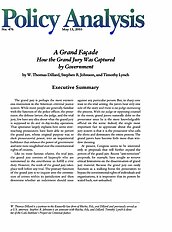The grand jury is perhaps the most mysterious institution in the American criminal justice system. While most people are generally familiar with the function of the police officer, the prosecutor, the defense lawyer, the judge, and the trial jury, few have any idea about what the grand jury is supposed to do and its day-to-day operation. That ignorance largely explains how some over-reaching prosecutors have been able to pervert the grand jury, whose original purpose was to check prosecutorial power, into an inquisitorial bulldozer that enhances the power of government and now runs roughshod over the constitutional rights of citizens.
Like its more famous relative, the trial jury, the grand jury consists of laypeople who are summoned to the courthouse to fulfill a civic duty. However, the work of the grand jury takes place well before any trial. The primary function of the grand jury is to inquire into the commission of crimes within its jurisdiction and then determine whether an indictment should issue against any particular person. But, in sharp contrast to the trial setting, the jurors hear only one side of the story and there is no judge overseeing the process. With no judge or opposing counsel in the room, grand jurors naturally defer to the prosecutor since he is the most knowledgeable official on the scene. Indeed, the single most important fact to appreciate about the grand jury system is that it is the prosecutor who calls the shots and dominates the entire process. The grand jurors have become little more than window dressing.
At present, Congress seems to be interested only in proposals that will further expand the powers of the grand jury. Recent “anti-terrorism” proposals, for example, have sought to remove critical limitations on the dissemination of grand jury material. Because the grand jury can easily function as a stalking horse for prosecutors to bypass the constitutional rights of individuals and organizations, it is imperative that its powers be scaled back, not unleashed.
About the Authors

This work is licensed under a Creative Commons Attribution-NonCommercial-ShareAlike 4.0 International License.
